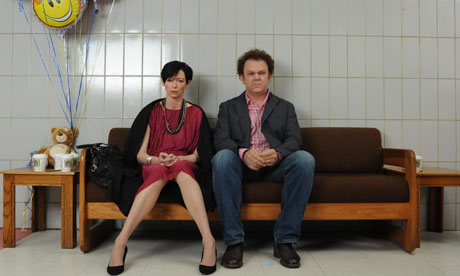
Whatever happens at the Oscars ceremony in Hollywood tonight, you can be sure of one thing: there won't be any statuettes handed out to the very best film of the year. While the board-sweeping success of a near-silent B&W beauty is a reason to be cheerful, not even the rule-breaking brilliance of Michel Hazanavicius's The Artist can outshine the excellence of my favourite film of 2011, which saw the Scottish director Lynne Ramsay making a triumphant return to our screens after a nine-year absence. Welcome back!
Superbly adapted (by screenwriters Ramsay and Rory Kinnear) from Lionel Shriver's supposedly unfilmable bestseller, We Need to Talk About Kevin (2011, Artificial Eye, 15) inhabits a painterly netherworld pitched somewhere between the subtle hues of European psychodrama and the bolder strokes of populist paedophobic horror. Tilda Swinton is mesmerising as the guilty mother tarred and feathered by the reputation of her titular son, living in the shadow of a malignance that is filtered always through her own jaundiced eyes. Is Kevin really the proverbial bad seed, sent to destroy his parents' life and marriage? Or is his broiling, almost preternatural hostility merely the reflected image of his mother's repressed but nonetheless projected anger?
Abandoning the letter-writing structure of the novel, and splashing the screen with expressionist colour (an orgiastic blood-red opening fiesta gives way to scenes of Swinton attempting to wash angry crimson paint from her front porch), Ramsay leap-frogs nimbly between juxtaposed time frames, building beautifully upon the musical structure that underwrote her first two features, the acclaimed Ratcatcher and the sorely underrated Morvern Callar. The fact that the soundtrack for We Need to Talk About Kevin slips from eerie Jonny Greenwood to upbeat Lonnie Donegan with ease merely reaffirms Ramsay's intuitive ear – like so many visionary film-makers her art often seems closer to conducting than directing, as if she listens with her eyes. One scene, in which our young tormentor eats a symbolic lychee, is a ghastly symphony of sound and vision, with Seamus McGarvey's superb cinematography perfectly complemented by hellishly intimate aural effects. The cast is outstanding too, with special notice due to upcomer Ezra Miller who oozes malignant intelligence and draws the camera's gaze like a moth to a flame. But ultimately this is Ramsay's triumph, a vindication that the years spent attempting to bring The Lovely Bones to the screen (a task ultimately – and unsatisfactorily – completed by Peter Jackson) were not wasted at all. Frankly, I'd be happy to wait a decade for another movie as good as this.
The problem facing Morgan Spurlock for years has been whether or not he could ever make a movie half as good as Super Size Me. The joy of his 2004 breakthrough feature was its simplicity, finding out just how rank McDonald's products really were simply by eating them. The fact that this no-budget guerrilla-flick caused the company to change its ways (they started pushing salads and handing out pedometers) proves that it hit them where it hurts: in the gut.
Now, after the meandering waffle of Where in the World is Osama bin Laden?, Spurlock makes a partial return to form with The Greatest Movie Ever Sold (2011, Universal, 12), to which the prefix "Pom Wonderful Presents…" should officially be added. Once again the idea is a doozy; to make a movie about product placement funded entirely by… product placement! Thus, in between interviews with Brett Ratner, JJ Abrams, Peter Berg and Quentin Tarantino about the day-to-day realities of franchise funding, we see Spurlock attempting to convince the makers of Mane 'n Tail shampoo that the image of the film-maker taking a bath with a Shetland pony will somehow enhance their market value. The results are funny and frivolous and will definitely make you notice the next time a Hollywood movie waves a can of carbonised drink in your face. Fittingly, the DVD features "The Greatest Amount of Extras You'll Ever See" – or at least that's what it promises on the packaging.
For anyone who has grown weary of the multiplex hell, which has become such a familiar part of modern life, Federico Veiroj's A Useful Life (2010, Dogwoof, U) may provide some heartbreakingly bittersweet relief. The director describes his central character – a cinephile cinematheque manager facing economic obsolescence – as a Don Quixote figure "conceived for an activity about to finish its existence", a role perfectly filled by critic-turned-actor Jorge Jellinek. There's a real sense of melancholy in the evocation of Jorge's plight, a pain made all the more acute by the realisation that last year marked the end of the line for many of the UK's most longstanding projectionists, whose art is apparently no longer regarded as an essential element of the movie-going experience.
The best thing about Andrew Niccol's In Time (2011, Fox, 12), a sci-fi thriller set in a world in which time is money, literally, is Cillian Murphy's Blade Runner-style law-enforcer-cum-avenging-angel; a clockwork Deckard. Like the somewhat superior Adjustment Bureau, this plays out like a superannuated episode of The Twilight Zone, as eye-candies Justin Timberlake and Amanda Seyfried attempt to outrun the forces of oppression before the clock runs out on them. Far from perfect, but it passes the time.
In his low-key but inventive directorial debut Jack Goes Boating (2010, Trinity, 15), Philip Seymour Hoffman intelligently transposes Bob Glaudini's stage play about four oddly estranged middle-agers to the screen with surefooted confidence. While the material isn't exactly groundbreaking, the director/star's affinity with his actors and understated visual experimentation pay solid offbeat dividends.

